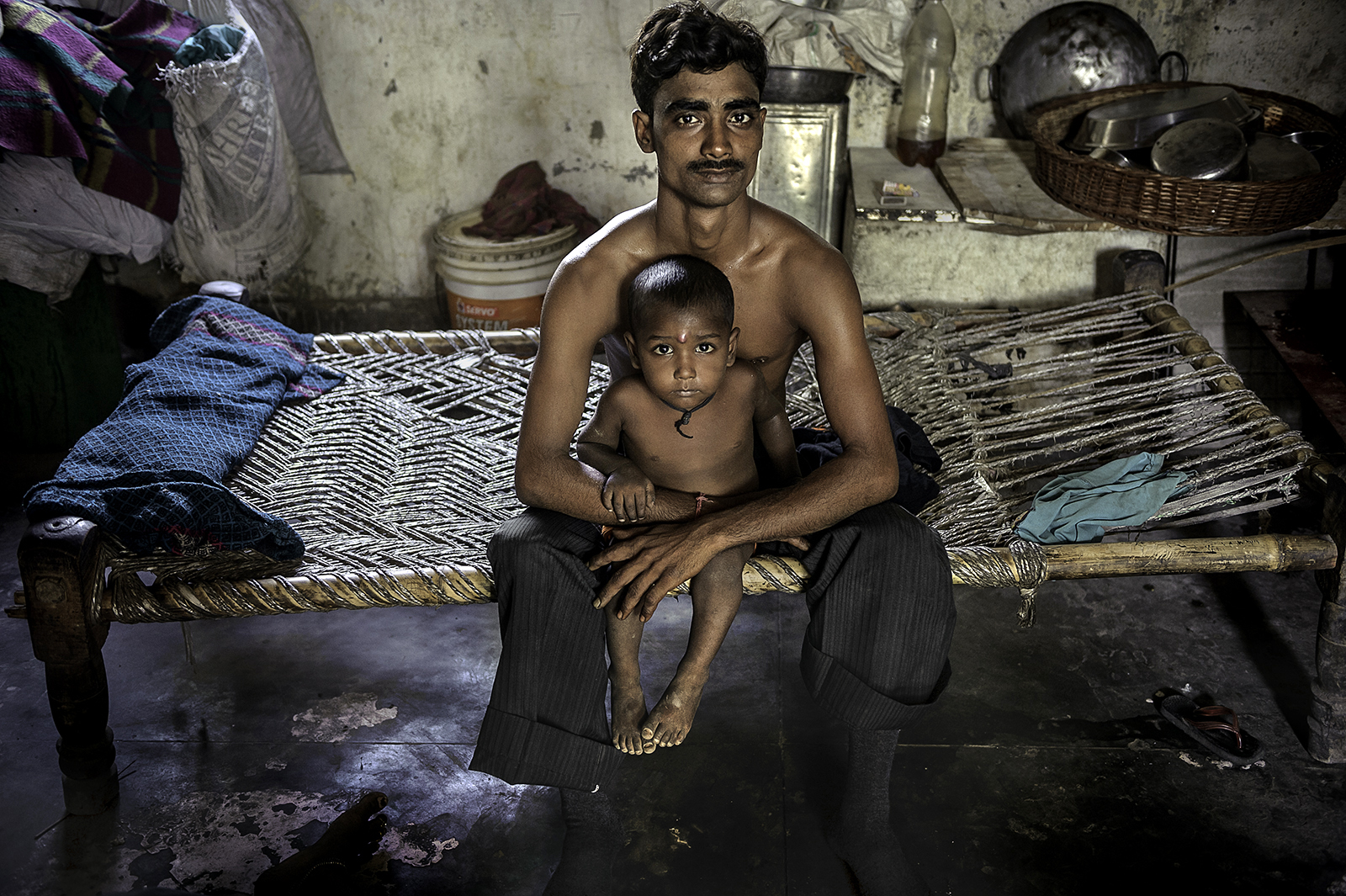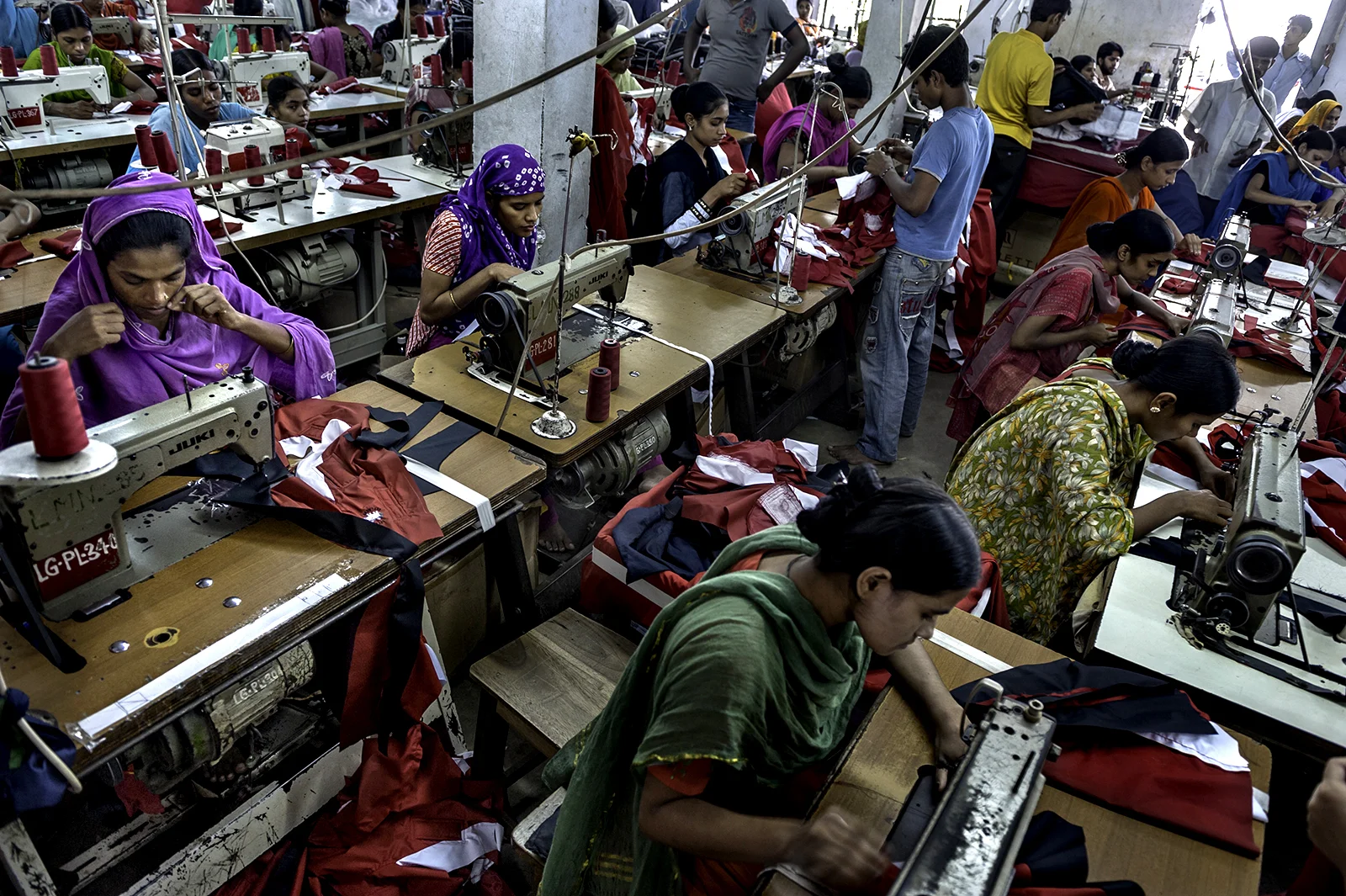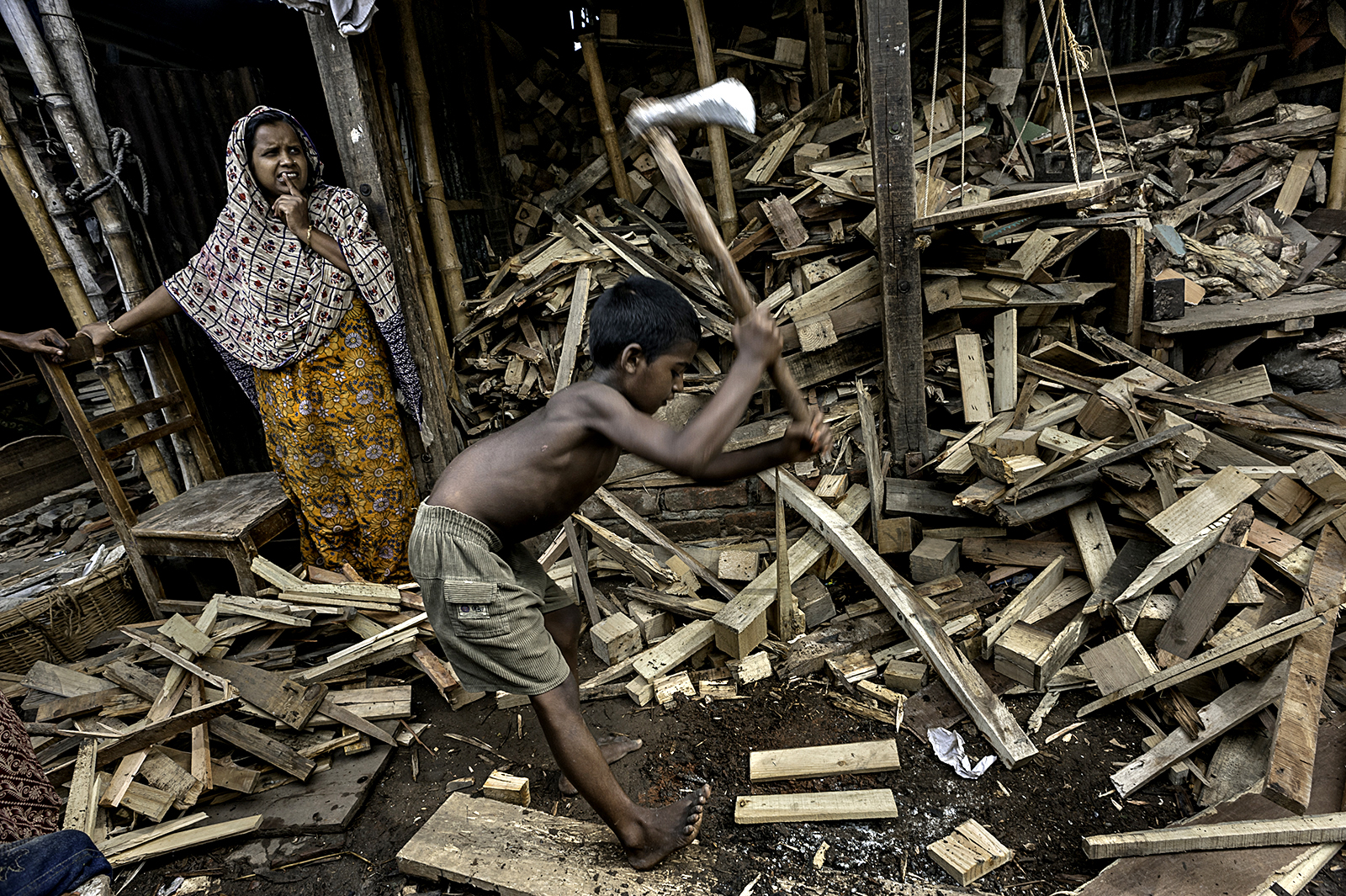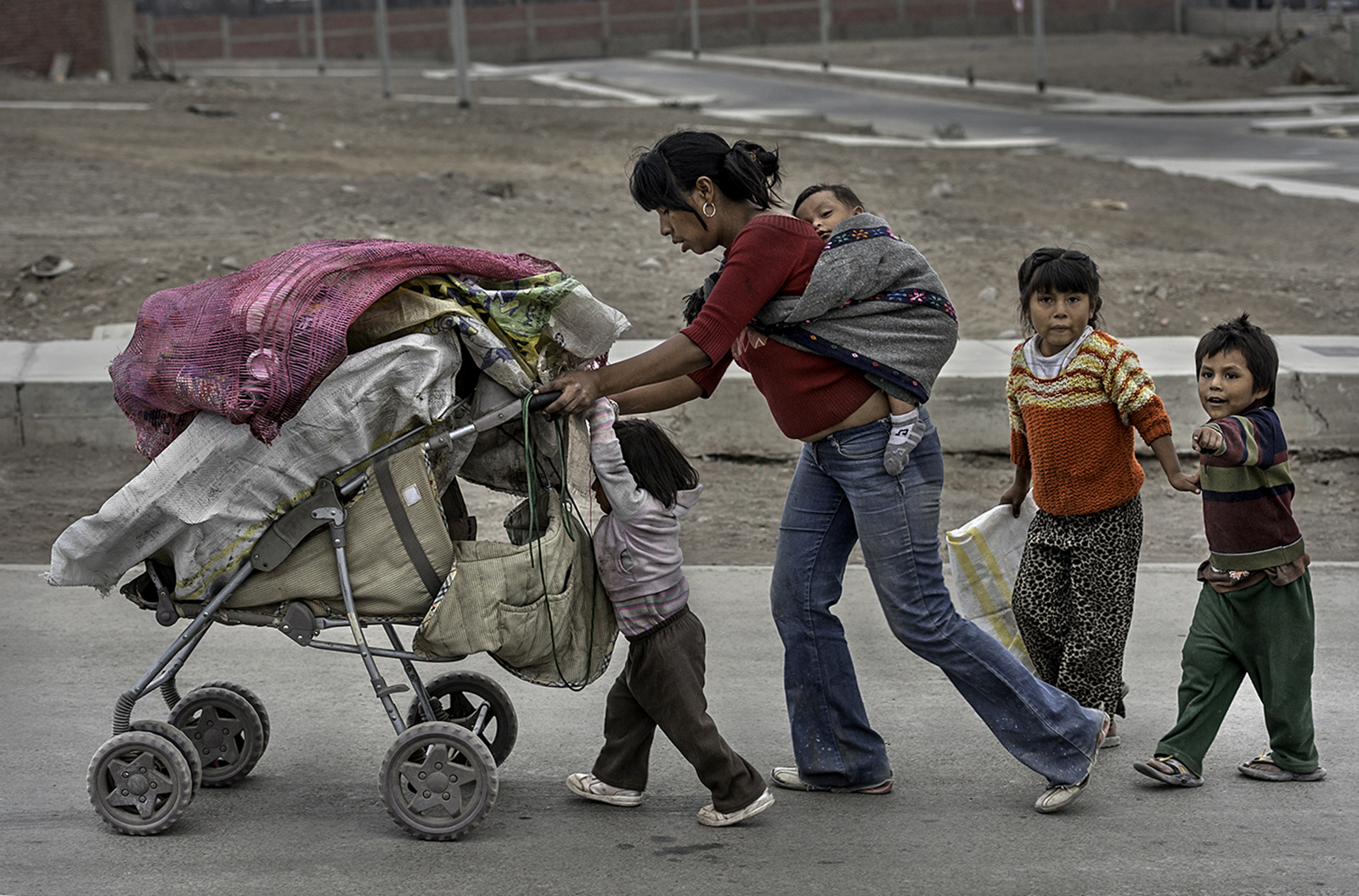
In Ghana in an e-waste dump that kills nearly everything that it touches, Fati, 8, works with other children searching through hazardous waste in hopes of finding whatever she can to exchange for pennies in order to survive. While balancing a bucket on her head with the little metal she has found, tears stream down her face as the result of the pain that comes with the malaria she contracted some years ago. This is work she must do to survive. © Renée C. Byer

Throughout the world women and children are sent out each day to collect the water needed for use by their families. Here is one such woman leaving her shelter after a full day of work to gather the precious water in a slum in Dharamsala, India. © Renée C. Byer

Kailesh Chand, 26, who sits with his son Om Prakash 2, is a machine operator in New Delhi, India. It is a job his brother had before he lost his leg in a work-related accident. They are squatters in Kale Khan along the Yamuna River in East Delhi living on government property but could be kicked out and have no place to live. He works six days a week and his shift changes daily to make $2 a day. He says his salary is okay now but worries about how he will afford to send his children to school later. His wife Sunita Devi stays home to watch their infant son Hemant. © Renée C. Byer

Jestina Koko, 25, with her daughter Satta Quaye, 5. Crippled since the age of three, she depends on her arms to lift and drag herself. She survives by doing laundry for others, selling cookies on the street, and begging in Monrovia, Liberia. © Renée C. Byer

In a brothel in Bangladesh, Labone, 27, takes a moment to hold her young daughter Nupur, 1, who was fathered by a client, before she has to return to her evening's work. © Renée C. Byer

In the Charan slum settlement of northern India, Kalpana, 20, starves one of her children Sangeeta, 2, while her sister Sarita, 5-months-old, right, sleeps in comfort, above right, in her mother's arms. Sangeeta only weighs 9 pounds. © Renée C. Byer

Complaining of stomach pains Viorica Gulie, 31, takes a break from cooking soup for her family as her mother-in-law Constanta Gulie, 58, looks on at left. She suffers from Gastritis of her stomach. With no money for medication or to go to the hospital she has to live in pain. Their house which has no running water or a bathroom is built on state land and they don't have title deeds so they are in fear of being evicted. Photo taken in Slatina, Romania.© Renée C. Byer

Mumtaz Hassanullah, 32 (far left, in purple), cuts thread with her teeth as she sews continuously in one of Bangladesh's many garment factories. It is a job she does from 8 A.M. to 8 P.M. nearly every day. These are long hours in an often hot environment which on average only pays her about 14 cents an hour, but it is work she accepts for it offers her at least a steady income, an income that she hopes to use to better the lives of her children. It is what is most important to her.© Renée C. Byer

In another area of Bangladesh, Saiful, 9, works splitting wood without shoes or any kind of protective gear. Few children who work as he does are given any rights in the workplace, for legally they are too young to be working at all. © Renée C. Byer

Docked on the shores of the Mekong and Tonle Sap Rivers, in Phnom Penh, Cambodia, these families live their whole lives and carry on all of their daily activities on small boats. At dusk, You Hai Yati, 4, washes herself in these waters. It is the same water that she and her family drink and use to cook every day. She is the youngest daughter of Y You, 50 and Soh Nop, 40. They have 7 children, the oldest is 24. All of them have never gone to school as their parents could not afford it. They could not read or write at all and only one of them has had a job rather than fishing along with their parents. They have been living on a boat along Tonle Sap and Mekong River Banks in Chroy Changva commune, Russei district of Phnom Penh since the fall of Khmer Rouge in 1979. They own no land or house. They own one boat a few chickens and a two year old fishing net that they keep repairing. © Renée C. Byer

Tibetob Gmafu, 5, left, Bidimei Gmafu, 5, center, Dawuni Bisun, 7, upper right, and Ninankor Gmafu, 6, below, seek cover from the rain as they keep a watchful eye on cows they were herding. The children say they are not allowed to bring the cows home in bad weather for fear that they will be beaten. They live in fear of a snake bite after their father was blinded by a snake and a brother died. They all wish they could go to school instead of working every day herding the animals in their village in the volta region of northern Ghana. © Renée C. Byer

In her home in Moldova, Viorica Bujor, 78, holds two goose eggs that will make up a significant part of her grandchildren's dinner. For twelve years this family has lived in a house with no electricity, broken windows, and no heat. © Renée C. Byer

A victim of Domestic violence Erika Gonzales, 36, forms a train like procession as she walks with three of her children as well as her grandchild fastened to her back through the streets of Lima, Peru, collecting recyclables. In Lima, 20 percent of all its waste is gathered up in this manner. Her children are needed to help her and do not attend school.The family lives in a room with no running water or bathroom on the verge of eviction.© Renée C. Byer

Following the death of his father, Alvaro Kalancha Quispe, 9, helps his family survive by herding. He opens the gate to the stone pen that holds the family's alpacas and llamas each morning so they can graze throughout the hillsides during the day. He then heads off to school, but must round them up again in the evening in the Akamani mountain range of Bolivia in an area called Caluyo, about an hour from the city of Qutapampa. In this part of the world, the highlands of Bolivia, approximately 13,000 feet above sea level, residents live in homes with no insulation, no electricity, and no beds. Their water comes from streams that run off the snow-covered mountains. Their livelihood lies with their animals, for each animal produces about three pounds of fur each year, and each pound of fur is sold for 18 bolivianos, which amounts to about $2.50 U.S. All in all, this family may earn about $200 of income each year from the herd they watch over. © Renée C. Byer

Three of five boys from the family of Dona Devi, 35, and her husband Kamal Singh, 50, play on a bed that occupies their entire living space in the Kusum Pahari slum in South Delhi, India. From left are Ajit Kumar, 5, Dilip Kumar, 9, background and Kuldeep Kumar, 10, foreground. Kusum Pahari slum in south Delhi (opposite Hotel Inter continental) is located on a garbage dump where meat butchers also graze their pigs. The pigs freely roam the neighborhood. There has been a government order to abolish the slum but the people that have been living there for almost 25 years have no where to go. © Renée C. Byer

Petru Stepaniuc, 9, right, prays with other children at the Center for Children in Chisinau, Moldova, before a lunch consisting of corn porridge. Petru has lived here since 2009. His father works in Russia but has not sent any money home to help him and his mother, who suffers from alcoholism. This center serves as an orphanage for many children who are left behind when their parents leave the country to try to find work but never return. © Renée C. Byer
